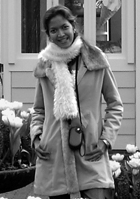Voices: "The Only Way Out Was to Share My Story"
September 2007—Jeanne D’Arc Truong is a program officer for the USAID/Health Policy Initiative in Ho Chi Minh City, Viet Nam. She is a board member of Friendship Group, a self-support group in southern Viet Nam that provides outreach, counseling, and care to people living with HIV/AIDS, and she is also a member of TREAT Asia’s Asian Community for AIDS Treatment and Advocacy.
M y first blood test for HIV was in mid-2000, when I was 23 years old. I had a problem with my nose and the doctor at the hospital asked me to take a western blot blood test before undergoing treatment. He made no mention of HIV, so I had no concept of what the test was for. When the results came back positive, the hospital refused to treat me for the problem with my nose, explaining that my disease could be transmitted to others through treatment.

Jeanne D'Arc Truong |
That’s when I truly understood that I had HIV. I walked circles around the hospital, feeling like I was already dead. I confronted my boyfriend in a pub and went crazy shouting at him. He took a bottle of beer and tried to beat himself on the head but I stopped him before he hurt himself. It made him miserable to feel like the culprit who had signed my death sentence. In 2001, he died of AIDS.
On the outside I was calm, but inside I felt a vindictive hatred for society. I disclosed my status to no one except my mother. Living silently with this disease, I felt as if I was going through a dark tunnel with no exit. I knew that the only way out was to share my story, but it was difficult to be open about having HIV. When I told my closest friend, for instance, she seemed sympathetic but she later confessed to feeling a little bit afraid to come in close contact with me or drink from the same glass.
By chance, I heard a friend’s mother mention an anonymous HIV counseling and testing site in our neighborhood. An HIV-positive peer educator at the site helped me to understand my condition. Through him, I joined the local Friends Help Friends Club in Ho Chi Minh City, a government-run program where people who were affected by HIV/AIDS provided psychological support to one another. Now, I confidently share my experiences with HIV, even though I frequently feel stigmatized, because I know my openness will be helpful to others.
Since 2004, I have been working as a program officer for POLICY Project Viet Nam [now the USAID/Health Policy Initiative], helping to establish and secure funding for self-support groups and networks of people living with HIV/AIDS. It was through this work that I met my husband, who is also HIV-positive. Since 2005, he and I have been active in Friendship Group, where he is a leader and I serve on the management board. The group has become my second family. We implement community outreach projects, meet with doctors specializing in HIV/AIDS, and share our experiences with work and happiness and sadness.
Women in Viet Nam with HIV/AIDS face diminished health, risk of mother-to-child transmission, and the financial burden of treatment, but stigma and discrimination are still, to me, the hardest issues to overcome. Women living in remote provinces are especially vulnerable, even from family, friends, neighbors, medical staff, and doctors.
The government in Viet Nam needs to prioritize programs for HIV-positive women. The free prevention of mother-to-child transmission programs initiated by the Ho Chi Minh City AIDS Committee, for example, are highly effective. Free antiretroviral treatment is also essential. Because I get free ARV treatment, I receive regular check-ups and treatment at a community counseling and support center, one of 20 sites of its kind in Ho Chi Minh City.
I still have some health issues: sometimes I feel exhausted, I get coughs, and my body’s resilience feels weakened. But I’m proud to work, live, and support the people who share my condition. Now that I work fighting AIDS, I have learned that the happiness of others is my happiness.